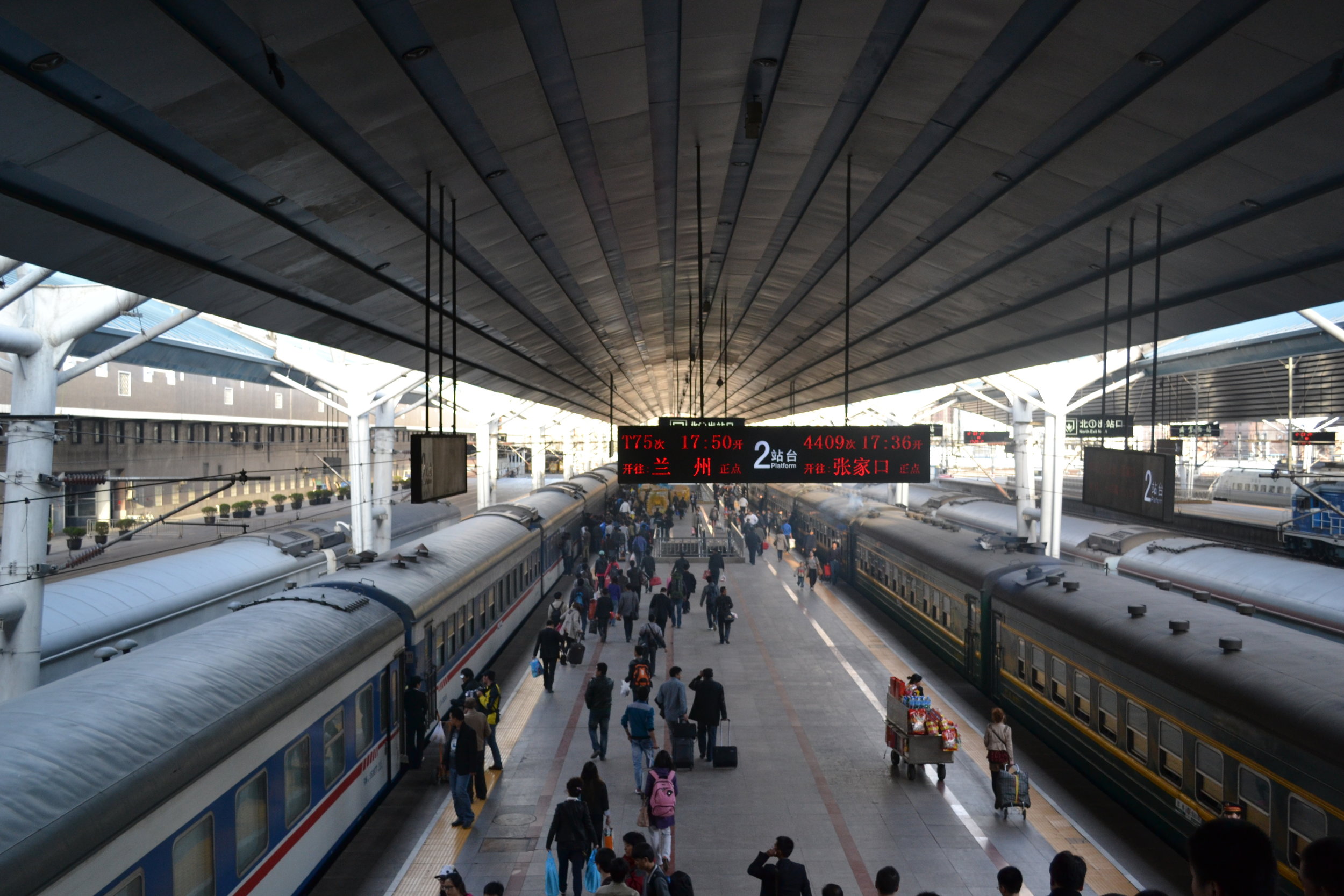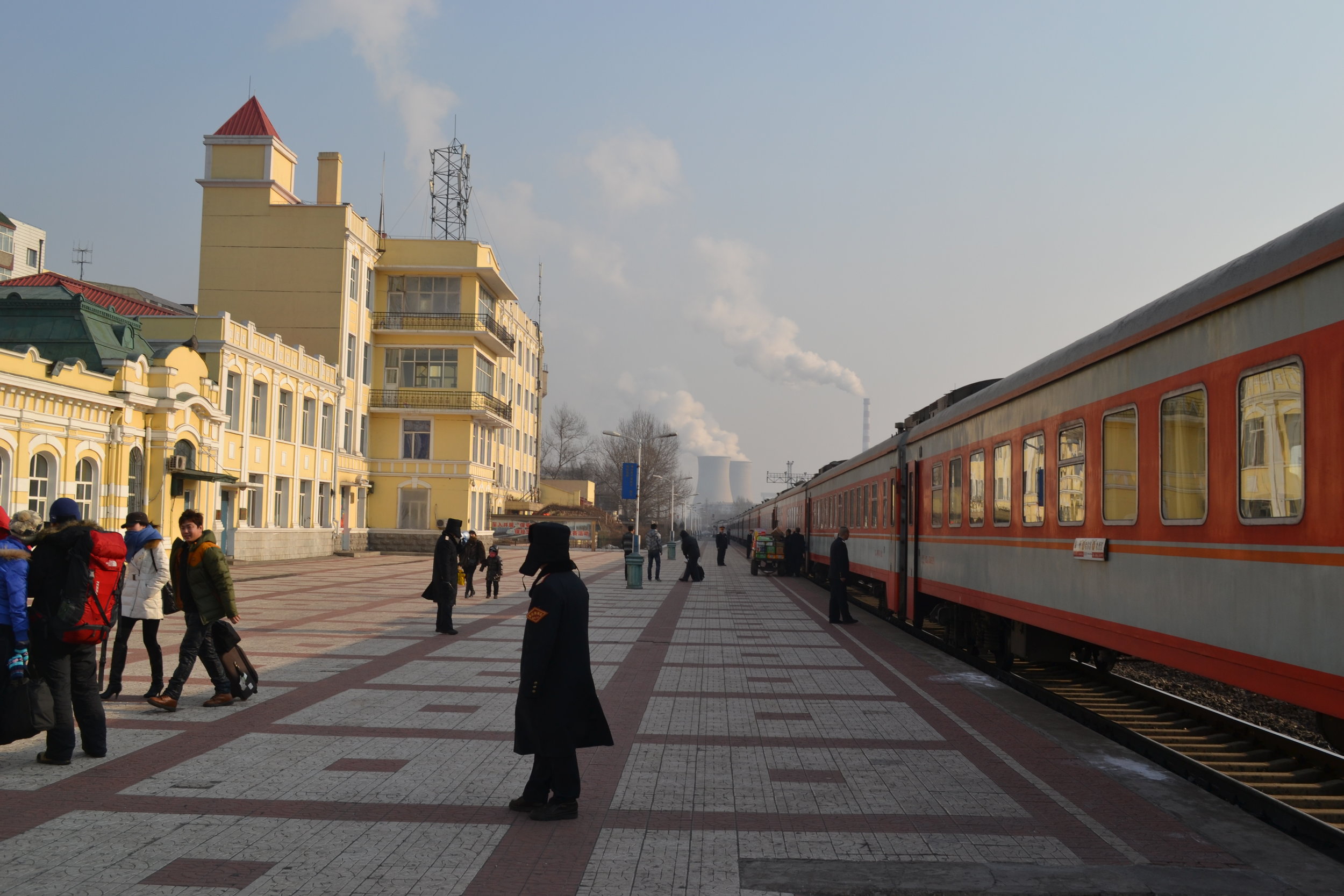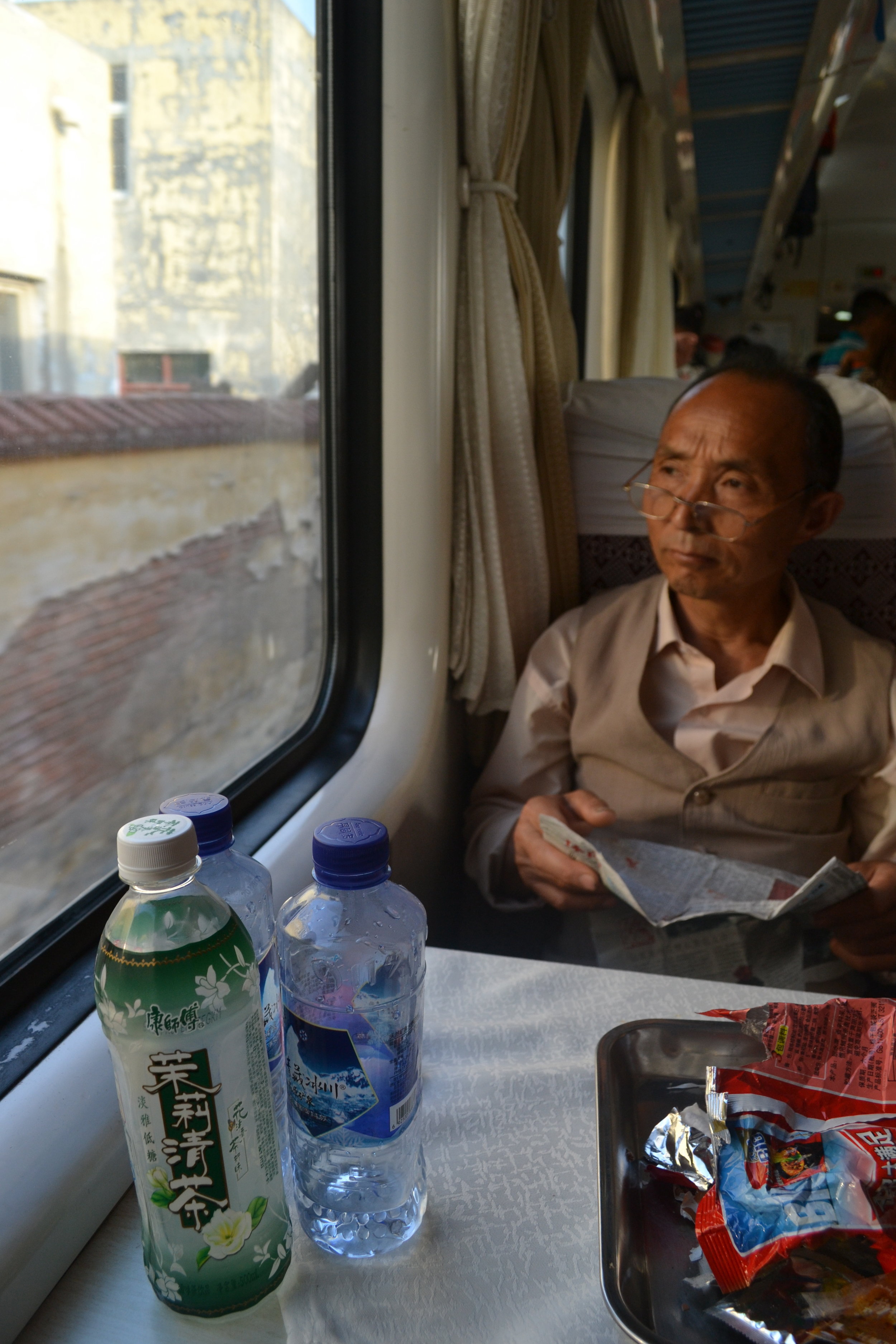China by Rail in the Year of the Dragon
Just outside Beijing, our train began to move. We had been standing still for nearly an hour, waiting for other faster trains to pass. Endless rows of new apartment blocks and wide newly-paved streets devoid of cars finally gave way to fields of wheat and corn and the villages spaced regularly apart every mile or so. As the warm glow of late afternoon gave way to dusk, a few fireworks exploded abruptly near the station as we made a stop in the city of Tangshan, where a devastating earthquake had struck back in 1976. As the sky darkened, a show unlike any other I had ever seen began to unfold across the plains of north China, a firework show staged in every village and town across the country.
The Chinese New Year sees the largest annual human migration on earth. In 2012, over 3 billion trips were made on China Railways in that month-long period. Most of those on our train had been unable to get earlier tickets out of Beijing to their hometowns. I was heading to Harbin to see the winter ice carving festival. The rush to get tickets before the traditional New Year’s Eve meant that the trains on January 23 were less crowded than during the days before. This year, the rollout of a new online ticketing system led to massive lines and periodic system crashes.
Each year, the handling of the “chunyun” or spring move season, as it’s called, is a test of bureaucratic competence and public trust in government. Although the March 2011 high-speed rail crash killed 40 people and exposed the rampant corruption behind China’s modern new high-speed network, the railway system is still the primary means of transportation for the country’s middle and working class. And despite safety concerns, construction of the high-speed system hurtles ahead.
For the next year, I traversed 11,000 miles on the country’s rail system. Along the way I met students, retirees, and countless others from all corners of China; from frigid Harbin in January to steamy southwestern metropolis Chongqing in August, and to the far western Xinjiang region.
Not only is train travel the best way to see the country as typical citizens do, it’s also the best way to talk to people. As the fireworks began outside our window, my traveling companions including several Americans, played a card game with a 30-year old graphic designer from Beijing returning to his home in Jixi, a town near the Russian border. He was shy but laughed often, and as bedtime approached, ordered us a plate of dumplings (the traditional new year’s food) that the train was serving only tonight.
In an age of incredible economic growth as well as growing inequality, trains are an unusual place of social mixing: students returning home from school, migrant workers returning to their villages from factories in the south, families on holiday. If the story of modern China has revolved around sprawling new cities and migration, it’s the unglamorous conventional trains that ultimately make this dynamic society possible and transport the bulk of migrant workers and the goods they make.
For long journeys with strangers staring at you from across the way, you have no choice but to talk. Usually the conversations begin with the usual questions: how much does the iPhone 5 cost in America? What do you think of China? Are you used to Chinese food? Is studying Chinese hard? Though on trains, more than other settings, the conversations end up wandering toward the realm of politics.
A middle-aged banker was discussing the issue of the Yuan exchange rate with us on a train from Harbin to Yabuli ski resort in China’s northeast. After my other American traveling companion asked him if he thought the Yuan was undervalued to the dollar, the man began to lecture us, “you don’t really understand China,” he stated in that common refrain told to all foreigners. “China does not manipulate its currency,” he said, as his teenage son looked listlessly out the window at the frozen fields and huddled villages of smokestacks passing us. “You Americans are always wanting to interfere in the affairs of others.” I tried to be the peacemaker, telling the man that even if China did in fact manipulate its currency, so too do many other countries, and that Americans were mostly concerned about unemployment rather than stopping China’s rise. But our economic roundtable didn’t last that long. “China has already come a long way,” he said, “all things must take time.”
It is typically thought that Chinese citizens are afraid or reticent to talk about politics openly. But the dislocating force of the train, a space neither here nor there, provides an unusual comfort zone that seems to put people at ease.
Traveling from Jiayuguan to Turfan in China’s far northwest Xinjiang province I began talking with a recent college graduate returning home from Nanjing where he attended university. He was a fan of bands like Green Day and Red Hot Chili Peppers. But he was also outspoken about his hatred for the Communist Party. Because of the ongoing dispute with Japan over the Diaoyu Islands, I asked him what he thought. He told me he thought it was merely a distraction to take focus off other more important issues like corruption. But another passenger next to us, about the same age, chimed in and started accusing him of having radical views. Pretty soon I was left to try to follow their rapid-fire exchanges as it ratcheted up. A middle-aged man sat on his cot and listened pensively without joining in.
“I love China, but I don’t love the party,” the one boy said.
“Don’t say these kind of things in public.”
“I know,” he responded. “But within the next thirty years the party will no longer be in power.”
“You can’t say that,” the other said.
Eventually they reached a kind of détente. The “radical” boy got out some kind of green bean snacks and offered them to all of us, as if mending fences. After endless stretches of desert sand and power lines we arrived in Turfan.
_
Traveling between the ancient capitals Xi’an and Luoyang, our train passes through what was once the heartland of Chinese civilization. Snaking its way out of the loess plateau we pass into the undulating plains of western Henan that on a clear day could almost be mistaken for southern France. Well, almost. People get off and on at small cities whose very anonymity makes them so exciting and banal at once: 渑池 Mianchi, a small industrial city outside of Luoyang where a tall guy with big sad eyes and glasses gets on and sits at the empty seat across from me.
His big eyes seem to want to tell me something I should know but don’t; he is not shy but calm. He sees me taking photos of the landscape as it goes by, asking me what I’m doing; I tell him I like to take photos of landscapes and trains in China.
“When you travel this route so often, it isn’t interesting at all.” He said.
Then he asked me the inevitable questions about the price of the Iphone 4 and how much it was in America. Even though I didn’t really know or care, I make up the approximate price I believe, about $400, if purchased with a phone plan. Even though it is manufactured in China, it is, due to taxes, more expensive here.
He is returning to the provincial capital Zhengzhou where he attends a trade school studying something painfully practical like machinery operation. He doesn’t think he will be able to get a good job after, even with a degree. He then casually asks me about Mark Zuckerberg.
“The Facebook founder, he dropped out of school right?” I nodded. “I saw the movie (The Social Network). He was a genius, but also evil, willing to lose his friends to pursue his dream.”
For the rest of the six and a half hour journey to Kaifeng, the seat in front of me functioned as a sort of musical chair, an Ask the Laowai (foreigner) hot seat. As we arrived in Zhengzhou my friend from Mianchi prepared to get off. “Goodbye” he said simply, smiled faintly, and got up.
The twilight sun shines through the windows of the train car as we wait in the dreary, sprawling railroad hub of Zhengzhou. For the rest of the 50 minutes until Kaifeng, the hot seat is occupied by an older man whose wrinkled face is filled with the stories of historical events and hardship that I, or even the seat’s previous occupant from Mianchi, could only imagine. Another older man sits down next to me with a metal lunch box and begins eating instant noodles.
This man was from Shanghai and was headed home from a trip out west. He was very matter-of fact, not too surprised to be talking with a foreigner. Maybe because he was from Shanghai. I tried to ask him about historical events from the Japanese invasion and Chiang Kai Shek. But he wasn’t particularly keen to relive old days. Instead he told me about his daughter who was the head of a travel company in Shanghai and had been to almost 60 countries, including America. He himself had been to 10 countries. He was also proud to tell me, somehow making the abrupt segway, that he lived in central Shanghai. Not the suburbs mind you, but right in the Jing’an district. Chinese NBA star Yao Ming lived nearby, he stated, and he often saw him when he walked around the neighborhood.
Later I heard him talking to another older man of similar age from Luoyang, asking where he was from. “Shanghai, Jing'an district, right there in the center of Shanghai!”
As my train approached Kaifeng I prepared to get off. I realized that despite the gap in age between these men, and myself I felt more comfortable talking to them than I had with any of the previous occupants of the Ask a Laowai hot seat. Perhaps it was because they were so far in age from me and already retired that they lacked a kind of restlessness and ambition that made them more likely to envy my status as an American. Or maybe I just liked old people for their stories and wisdom.
He was from an entirely different generation and yet for some reason I felt more sympathy and understood him more than the youngsters who, although they listened to Lady Gaga, watched Big Bang Theory and soaked up all the superficial trappings of global culture that would presumably make it easier to converse with me, yet somehow only reinforced the chasm of experience between us.
Another old fellow was sitting across from me now, from Luoyang (pictured above), also headed to Shanghai. His face was great: full of wrinkles and character, stories. He was reading the newspaper and munching on green bean snacks as the dusk light struck his face in a particularly dramatic way and I tried slyly taking a picture of him as we rolled out of Zhengzhou.
The two old fellows were both warm and friendly but with none of the awkwardness of those fellow twenty-somethings who looked at me with jealousy or sadness. Despite, or perhaps because of all the turmoil and horror they had probably lived through, they exuded a confidence, a stoicism that was, at least to me, reassuring. I saw in this man the China of the Republican period, of Chiang Kai Shek: of Confucian values and literati, teahouses, and turn of the century opium dens. It was so much easier to make sense of than the China of today.







